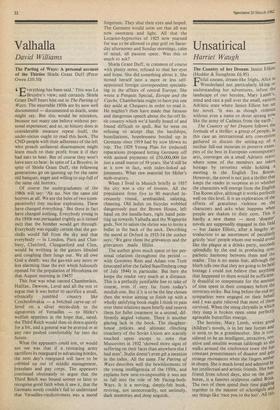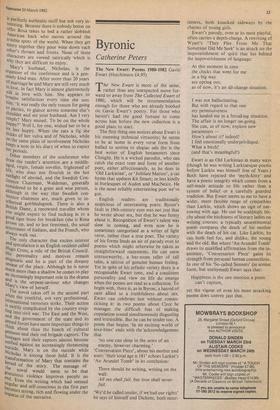Unsatirical
Harriet Waugh
The Country of her Dreams Janice Elliott (Hodder & Stoughton £6.95)
Ffitful unease, dream-like fright, Alice in Wonderland not particularly liking or understanding her adventures, infuse the landscape of our heroine, Mary Lamb's, mind and cast a pall over the small, eastern Adriatic state where Janice Elliott has set her novel. 'It was as though violence without even a name to shout sprang now like the army of Cadmus from the earth.' The Country of her Dreams follows the formula of a thriller: a group of people, in this case an international arts convention gathered to discuss the setting-up of a nuclear fall-out museum to preserve exam- ples of the best in European contemporary arts, converges on a small Adriatic resort where some of the members are taken hostage by terrorists while holding a meeting in the English Tea Roorn. However, the novel is not just a thriller that keeps the reader in suspense as to whether the characters will emerge from the English Tea Room alive, although it works perfectly well on this level. It is an exploration of the effects of gratuitous violence on the characters and asks what happens when people are shaken to their core. This IS hardly a new theme — most 'disaster' novels are supposedly engaged in this field — but Janice Elliott, after a lengthy in- troduction to an assortment of peculiarly grizzly 'nice' people whom one would avoid like the plague at a drinks party, succeeds splendidly by the end in producing syrn- pathetic harmony between them and the reader. This is no mean feat; although the blurb tells one that they are going to be held hostage I could not believe that anything that happened to them would be sufficient- ly dreadful to compensate for the amount of time spent in their company before the terrorists strike. But long before the end MY, sympathies were engaged on their befall and I was quite relieved that most of them survived. When the smug chrysalis in which they sleep is broken open some perfectly agreeable butterflies emerge. The heroine, Mary Lamb, writes good Children's novels, is in her late forties and is soon to be a grandmother. She is con- sidered to be an intelligent, attractive, sen- sitive and sensible woman (although as she walks around the conference town she has constant presentiments of disaster and gets strange resonances when she fingers amber in shops). She is much loved and admired by her intellectual and artistic friends. Her best friend from school days, also on the _lain' boree, is a famous sculptress called Rosa. The two of them spend their time gigginig, together in the manner of schoolgirls air say things like 'race you to the loo'. All this is perfectly authentic stuff but not very in- teresting. Because there is nobody better on offer Rosa takes to bed a rather slobbish American hack who moves around the trouble spots of the world. When they get Merry tOgether they pour wine down each other's throats and fronts. None of these characters are viewed satirically -which is why they are difficult to enjoy. Mary's husband, Nicholas, is the organiser of the conference and is a gen- uinely kind man. After more than 20 years of marriage he and Mary are still very much iii love. In fact Mary is almost gluttonously still in love with him. She appears to breathe satisfaction every time she sees hum 'It was really the only reason for going to Parties, to glance across someone else's shoulder and see your husband. Am I very simple? Mary mused. To be on the whole happy?' Well I, for one, wished her to be a lot less happy. When she eats a fig she thinks of her vulva and of Nicholas, while On the same plain of involvement Nicholas keeps a note in his diary of when to expect her periods.
Other members of the conference who draw the reader's attention .are a middle- aged, virgin, female novelist, frightened of life, who does not flourish in the hot sunlight of abroad, and the Swedish Con- ference Chairman, Waldemar, generally considered to be a great and wise person, although in the way that Swedish con- ference chairmen are, much given to in- tellectual gobbledegook. There is also a British Dame, a renowned traveller whom You might expect to find tucking in to a good tiger bone for breakfast (she is Rosa grown up, and so less tiresome), the usual assortment of Italians, and the French, who always walk out.
The only character that excites interest
Hugo Cross, a relic of the British Council. nts personality and motives remain enigmatic and he is part of the dreamy unease of the place. Although he is never much more than a shadow he comes to play an increasingly important role in the drama and is the serpent-saviour who changes wlai'Y's view of herself. The novel takes off in the second part When the youthful, not very professional, international terrorists strike. Their action swiftly complicated by the country erup- ting into civil war. The East and the West, and the government of the state and its armed forces have more important things to think about than the bunch of cultural geniuses and their red brigade captors. The hostages and their captors almost become unified against an increasingly threatening outside. Mary is on the outside while Nicholas is among those held. It is the transformation of Mary that contains the "Mel of the story. The message of the novel would seem to be that :tatuitous violence improves people no 11d. Even the writing which had seemed angular and self-conscious in the firstpart becomes strong, rich and flowing under the impetus of the narrative.



































 Previous page
Previous page